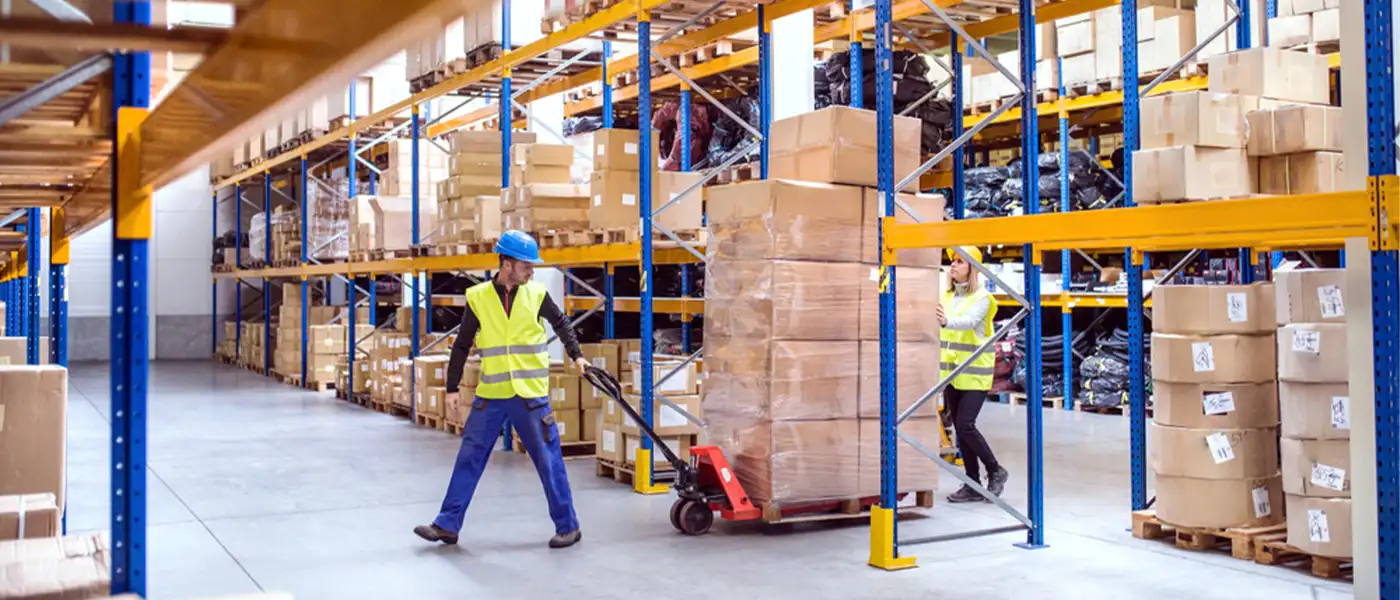In addition to guaranteeing safe and reliable shipment delivery, DDU shipping streamlines tracking shipments and controlling costs. It uniquely benefits the seller and buyer, ensuring the goods are shipped safely.
Reading this article familiarizes you with DDU shipping, the difference between DDU and. DDP shipping, and the working process of DDU shipping. Know merchants and consumer responsibilities, risks of DDU shipping, DDP fees, and more here.
What Is Delivered Duty Unpaid (DDU)?
Delivered Duty Unpaid (DDU) is an international trade term. It states that the seller is accountable for safely delivering goods to the consumer’s destination. The seller has to pay all the transportation charges and is responsible for any risk during the transport. The buyer is accountable for import duties.
The key benefit of using DDU shipping is that it equips the buyer with more control over shipping procedures. One of the most significant issues buyers may find in DDU shipping is the likelihood of surprise tax charges and duties when their shipment arrives.
What is the Difference between DDU and DDP?
DDP and DDU are the Incoterms defined by the International Chamber of Commerce. They play prominent roles in global commerce. However, DDP and DDU have some differentiating points, which are as follows:
| DDU shipping | DDP shipping |
| In DDU shipping, the customer is responsible for paying the destination country’s customs duties, charges, or taxes. These charges should be paid to let customs release the shipment after it arrives. | In DDP shipping, the shipper is responsible for paying customs duties, charges, and/or taxes levied when sending the goods to the destination country. |
| The seller must pay for the delivery expenses to the destination country. After the goods reach the destination country, the responsibility is transferred to the buyer. These shipping terms favor both the seller and the buyer because each assumes responsibility in their country. | The seller is tasked with most of the burden, including the cost of transporting the goods to the buyer’s destination. The buyer has very little responsibility in the delivery process. |
| The onward carriage is the buyer’s responsibility. | The seller must arrange for the onward carriage and convey the goods from the destination port to the buyer’s favored location. |
| The seller is free from the responsibility for clearing the goods from customs of the destination port. | The seller must remove the goods from customs at the destination port. |
Why is DDP Used?
The following points justify the usefulness of DDP.
- It protects the buyer because the seller is responsible for all costs and risks in the shipping process. The seller has to bear all transportation risks and costs, discouraging scammers.
- DDP guarantees safe delivery as the seller is likelier to choose the safest and best carriers and routes.
- It guarantees a smooth buying experience because the buyer need not be concerned about the clearances, duties, customs fees, transportation, transit delays, etc.
How Does DDU Work?
In DDU shipping, the seller ought to deliver goods to the destination in the country from where import is planned. The seller bears all the delivery and export expenses. The buyer is responsible for the further delivery of goods, costs of delivery, import duties, customs duties, and transportation costs. This holds true unless other shipping terms are determined in advance.
The package forwarding service completes the export paperwork and bears the fees. These fees are listed in the cost decided with the package forwarding service. Repackaging fees are also considered if required.
Once the goods are dispatched from the forwarding service, the buyer has to bear all the import costs, including VAT.
Should I send my shipment via DDU or DDP?
Various factors need to be considered before sending your shipment via DDP or DDU, various factors must be considered.
Certain sellers send shipments via DDU to prevent obstacles in the buyer’s country. On the other hand, some other sellers have an established network with a logistics company.
Sending shipments via DDP is advantageous for new buyers with limited knowledge of international shipping practices. Shipping DDU proves cheaper if the seller owns the logistical capabilities and a trustworthy clearing agent.
A DDU shipment is better than a DDP shipment when the seller needs to be a registered entity in the buyer’s country. In this case, the situation favors the buyer more, making DDU a better alternative.
If the buyer perceives the seller’s administration fees as high, it is better to adopt DDU shipping to prevent additional expenses.
What Are the Responsibilities of the Merchant?
The merchant’s critical responsibilities in a DDU shipment are:
- Enclosing an invoice and documentation
- Passing on all financial liability being the record’s importer to the consumer.
- Passing on all duties, formalities, and licenses to the end consumer
What are the Responsibilities of the Consumer?
The consumer’s primary responsibilities in a DDU shipment are:
- Import tariffs, taxes, duties, and formalities
- Bear all inspection and customs-related expenses
- Gathering all commercial documentation, licenses, and authorizations required for import and then arranging for the import clearance and other paperwork
What Are the Risks of DDU?
After the shipment arrives in the buyer’s country, all the responsibilities transfer to the consumer. Moreover, the consumer must complete the customs clearance. It implies that if anything goes wrong, the release of goods might be delayed by a few weeks or months.
Consumers may be charged additional costs and can even reject the items. Consequently, it leads to a situation wherein the merchant has to pay high return fees or compensate for the lost inventory.
The seller must provide you with goods required to be cleared off in import on the board of the vessel in the consumer’s country. This is where all the risks of damage and loss of goods transfer from the seller to the buyer.
Buyers have to bear all risks after the shipment is delivered to the agreed port of destination and is prepared for import customs clearance.
DDP Fees That Sellers Need to Monitor
DDP is prevalent among sellers but it charges hefty fees. You can determine whether DDP shipping is appropriate for your business or not based on these two aspects.
- You need to calculate the fees to be paid
- Determine whether you would earn profits from your sales or not
The seller is responsible for the following fees:
Shipping fees
Shipping products by air or sea can be costly. You must calculate the cost of shipping products internationally.
Import and export custom duties
The inbound shipments are usually scrutinized by customs if DDP is poorly handled. It creates delays. Late shipments may happen if you choose a less reliable transportation service due to its low price.
Damage fees
The seller bears the cost for any damage incurred to the shipment. Also, the seller has to ship them again to the respective destination in case of any damage to the item.
Shipping insurance
Shipping insurance is not mandatory, but most sellers purchase it to reduce the monetary risk.
VAT
DDP shipping requires the seller to pay the VAT. Online merchants in the DDP Incoterms must permanently authorize VAT requirements before selling their goods online. This helps them to calculate the impact on their profit margin and shipping costs.
Moreover, VAT payment in DDP shipment may alter with the buyer’s and seller’s prior approval. The buyer may be entitled to a VAT refund, depending on what they do with the shipment.
Storage and demurrage
The seller should bear the costs related to customs clearance in DDU shipping. This covers any storage or demurrage costs suffered due to delays by delivery drivers, ocean/air carriers, customs authorities, and other government agencies. These are unexpected costs which rapidly reduce the seller’s profit or entirely offset them.
Conclusion
DDU shipping involves sellers who guarantee safely delivery of goods to the consumer. It simplifies the seller’s tasks and equips the buyer with enhanced shipment tracking and expense control. The shipping process is reliable because both the seller and the buyer undertake responsibilities in their country. Moreover, DDU shipping protects the buyer from additional expenses like taxes, customs, transport costs, and other administrative charges.
FAQs
Is DAP the same as DDU?
DDU is the same as DAP. In 2010, Delivery duty unpaid (DDU) was substituted by DAP (Duties-at-place). It implies that the buyer is accountable for all taxes, import duties, and customs clearance.
Does DDP include customs clearance?
Yes. DDP shipping involves the seller paying for customs clearance. The seller must conduct extensive research to assess the additional expense of customs clearance and its influence on their total shipping costs and profit. DDP incoterm makes the seller responsible for clearing import duty, customs fees, shipping costs, and import clearance. The seller bears the loss and damage expenses too.
Is DDU cheaper than DDP?
DDU shipping is more affordable than DDP. When buyers opt for the DDU shipping terms, they are charged with the good’s price and shipping fees until the goods are delivered. You need not pay the cost related to onward carriage, import duties, etc.
In DDP shipping, the seller charges the buyer for the processing fee that covers clearing the shipment at the port. It also charges for customs duties, inspections, onward carriage, VAT, etc. in the destination country.
What are the key benefits of DDU shipping?
The key benefit of DDU shipping is that it equips the buyer with enhanced control over the shipping processes ensuring steady flow of inventory.
Tracking shipments and controlling costs are easier in DDP shipping than in DDU shipping. Buyers are usually more informed of their country’s shipping customs.DDU shipping provides enhanced control to the seller. They are responsible for conveying the shipment to its destination, after which the buyer can manage the legal complications.
What shall be considered before implementing DDP or DDU shipping for your e-commerce store?
It is vital to define your e-commerce store’s expectations whether you choose DDP or DDU shipping terms. You also need to consider business models and customer’s savviness. You need to clarify how duties and taxes will be handled on product pages, in e-mail confirmations, at your e-commerce store checkout, in your shipping policy, and on your e-commerce store’s FAQ page.
What are the benefits of DDP over DDU shipping?
Here are the three key benefits of DDP over DDU shipping.
i. In DDP shipping, sellers have to pay cargo taxes, and import and export fees. This shipment process becomes easier for buyers as they don’t have to bear additional costs before delivery.
ii. DDP shipping handles all international transportation requirements. It implies that the courier facility is responsible for handling shipments from cargo pickup, preparing the necessary paperwork, and bearing the shipping costs under the same shipping agreement.
iii. The buyers stay stress-free about the customs processes of a country and the shipping requirements.






